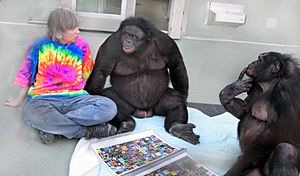Sue Savage-Rumbaugh facts for kids
Emily Sue Savage-Rumbaugh (born August 16, 1946) is a psychologist and primatologist. She is famous for her studies with two bonobos, Kanzi and Panbanisha. She explored how these apes could learn and use language. Her research involved special keyboards and lexigrams (symbols that represent words).
Contents
About Sue Savage-Rumbaugh
Sue Savage-Rumbaugh earned her first degree in psychology in 1970. She then completed her master's and Ph.D. in psychology in 1975. She worked closely with her former husband, Duane M. Rumbaugh. He was also a pioneer in studying how apes learn language.
Her Work with Apes
Savage-Rumbaugh spent many years as a professor and researcher. She worked at Emory University's Yerkes Primate Center. Later, she moved to Georgia State University's Language Research Center.
In 2005, she moved to Iowa. There, she helped start the Ape Cognition and Conservation Initiative. She brought Kanzi, one of the bonobos, with her. In 2012, she faced some challenges at work. After a medical leave, she left the center in 2013. She then moved back to her home state of Missouri.
Amazing Ape Language Research
Sue Savage-Rumbaugh was the first scientist to study language with bonobos. Her work changed how people think about animal intelligence.
How Apes Communicate
At Georgia State University, Savage-Rumbaugh helped create new tools for studying primates. These tools included a keyboard that could speak English words. This allowed the apes to communicate using spoken language. She also used a special computer terminal with a joystick. This let the apes do many different computer tasks.
Her research showed that apes could learn symbols and understand spoken words. They could also understand simple sentence structures. They even learned about numbers and quantities. This work helped people see that other primates are very smart.
Kanzi's Special Abilities
Savage-Rumbaugh's work with Kanzi was very important. Kanzi was the first ape to learn words naturally, much like human children do. This research was described in a book called Language Comprehension in Ape and Child (1993). This book was chosen as one of the top 100 most important works in brain science of the 20th century.
Some scientists, like Steven Pinker, disagree with Savage-Rumbaugh's view. They believe that language is only for humans. They argue that apes like Kanzi do not truly understand the basics of language.
However, Savage-Rumbaugh's approach was unique. She raised the apes from birth. She surrounded them with a "linguistic world." This was different from other researchers who used more strict lab methods. She and her former husband lived very close to the research center. This meant they were always available to care for the apes.
Some studies, like those by Terrace et al. (1979), suggest that apes do not create complex sentences. They believe that what looks like language might be explained by simpler learning methods.
Awards and Recognition
Savage-Rumbaugh has received several honors for her work. In 2000, she won the Leighton A. Wilkie Award in Anthropology. In 2011, Time magazine named her one of the 100 Most Influential People in the World.
She has also received honorary Ph.D. degrees. These were from the University of Chicago in 1997 and Missouri State University in 2008.
Personal Life
Sue Savage-Rumbaugh has lived in Missouri, Georgia, Iowa, and New Jersey. From 1976 to 2000, she was married to Dr. Duane Rumbaugh. He was also a primate research scientist. She has a son named Shane.
See also
 In Spanish: Sue Savage-Rumbaugh para niños
In Spanish: Sue Savage-Rumbaugh para niños




